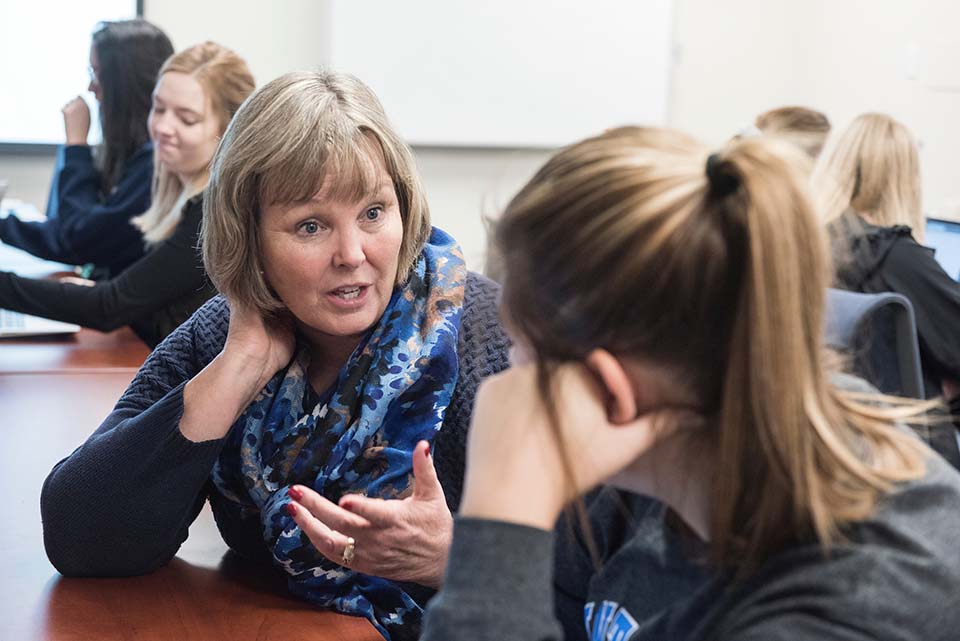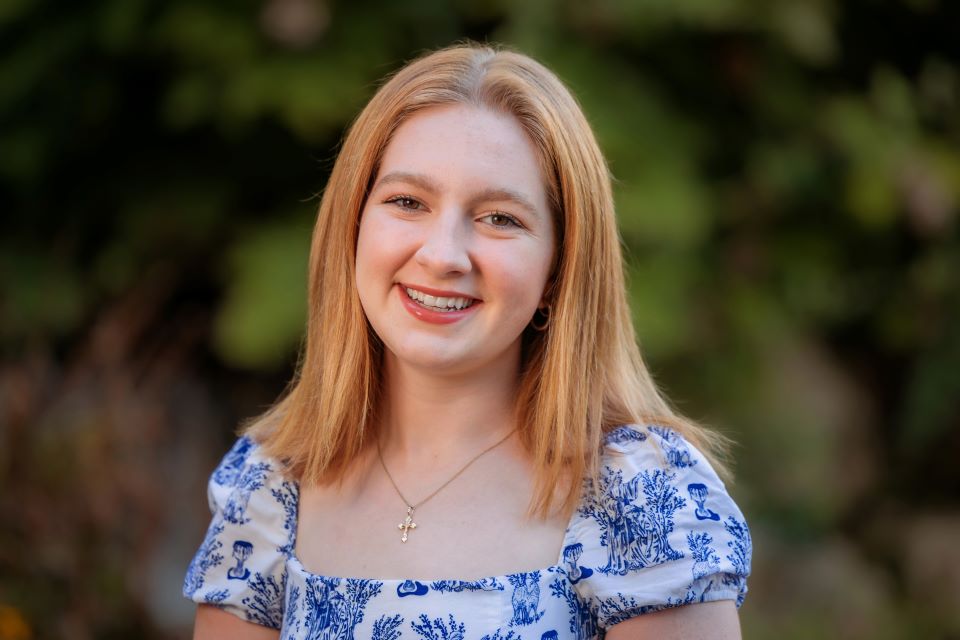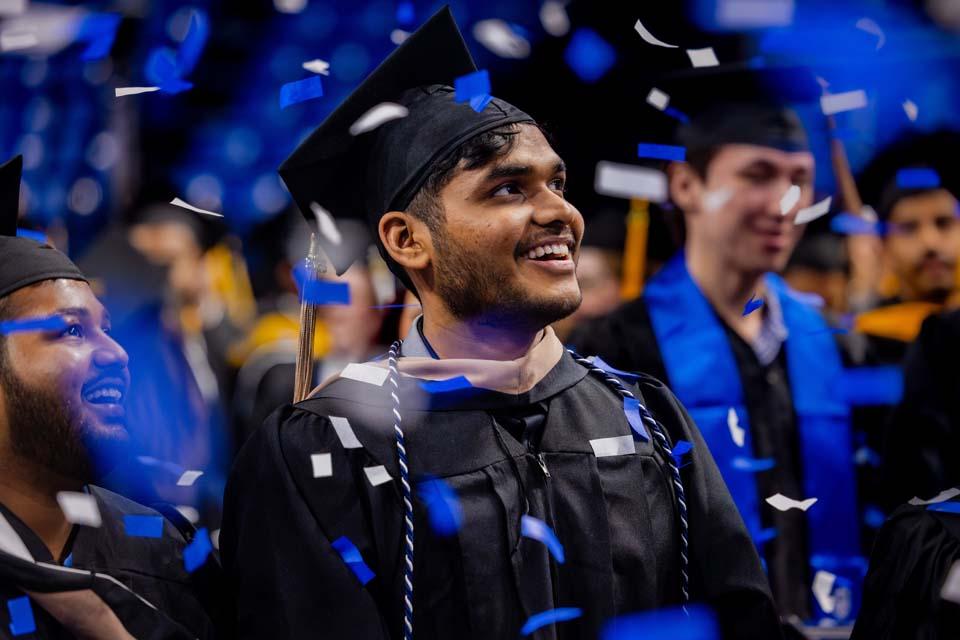SLU Alumnus Shares Transformative Power of Higher Ed for Formerly Incarcerated
ST. LOUIS — Formerly incarcerated individuals often get a bad rap, but one Saint Louis University alumnus is changing the narrative.
Stanley Andrisse, Ph.D. (A&S Grad ’14) is the author of From Prison Cells to PhD, which chronicles his experiences with incarceration and higher education after his return to the community.
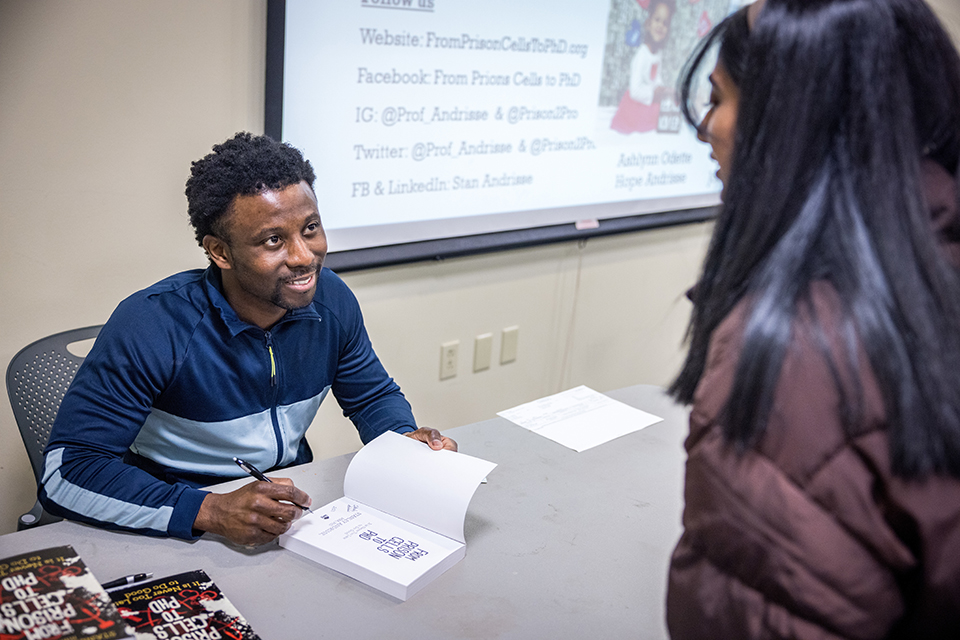
SLU alum Stanley Andrisse, Ph.D., signs copies of his book From Prison Cells to PhD at the Busch Student Center on Friday, Jan. 20, 2023. Photo by Sarah Conroy.
Andrisse applied to six biomedical graduate programs. He was rejected from all but one – SLU, he said during a discussion and book signing hosted by SLU’s Prison Education Program (PEP) on Friday, Jan. 20, at the Busch Student Center. He credited a mentor from SLU who served on the admission committee with giving him a second chance.
For nearly 15 years, PEP has contributed to creating a world where everyone has access to quality and sustainable higher educational opportunities regardless of their involvement with the criminal justice system. Though not an alum of PEP, Andrisse is a staunch advocate for the transformative power of higher education.
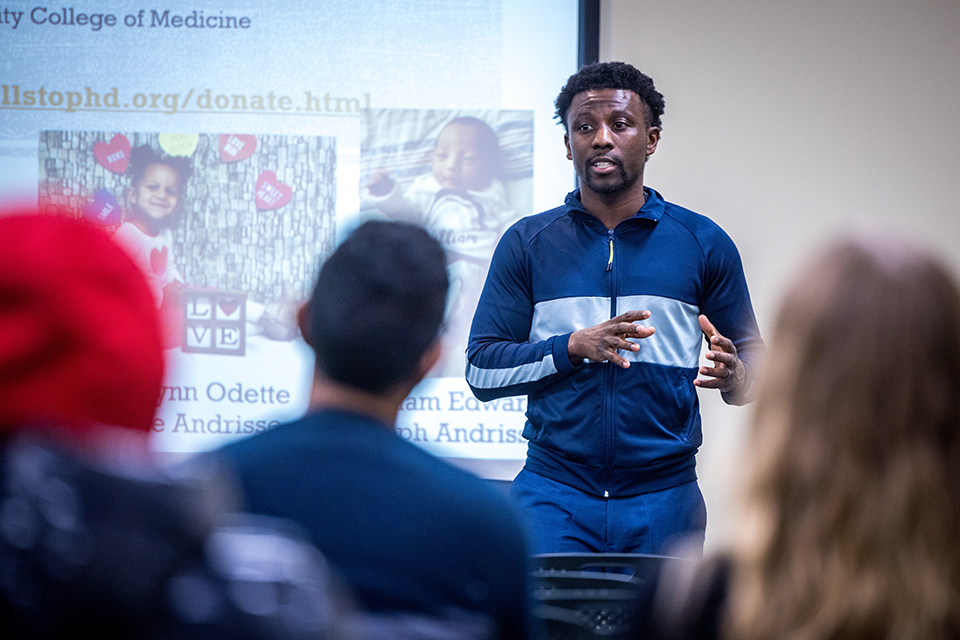
SLU alum Stanley Andrisse, Ph.D., speaks about his book From Prison Cells to PhD at the Busch Student Center on Friday, Jan. 20, 2023. Photo by Sarah Conroy.
He discussed being sucked into the school-to-prison pipeline, recounting more out-of-school suspensions than his peers, tepid support from his educators in the classroom, and his first criminal run-in with the law at 15. That led to multiple felony convictions on his record and serving more than three years of a 10-year sentence in a maximum-security prison on drug trafficking charges.
Andrisse was criminalized as a hopeless, repeat offender by the prosecuting attorney. Now, he is an assistant professor of endocrinology at the world-renowned medical institution Howard University College of Medicine and a visiting professor at Georgetown Medical Center.
He molds some of the brightest minds in medicine while researching type 2 diabetes and insulin resistance, which is the disease that claimed the life of Andrisse’s father while serving time in prison.
“It’s never too late to do good,” said Andrisse in Creole, recalling the words of his Haitian father.
Andrisse says society shouldn't hold people’s prior convictions against them in pursuing higher learning, as he believes they aren’t indicators of one’s potential and ultimate contributions to society.
He referenced a 2013 analysis of several studies that found obtaining higher education reduced recidivism – the rate of returning to prison – by 43 percent and was four to five times less costly than re-incarcerating that person. Yet, he adds, less than 4 percent of people released from incarceration each year have a college degree.
As executive director and co-founder of the nonprofit From Prison Cells to PhD, Andrisse is dedicated to improving access to higher education for incarcerated or formerly incarcerated men and women.
The nonprofit is currently helping to "Ban the Box" on college applications nationwide, expand the Second Chance Pell grant, and remove the Convictions Question from the FAFSA. Through the Bridges to the Baccalaureate program, the nonprofit aims to change the face of the STEM workforce.
In the end, Andrisse credits his mentors for believing in his potential to chart a new course for his life and for helping him to rise above negative influences. After all, had Andrisse listened to the naysayers, he wouldn't have become Dr. Stanely Andrisse.
About Saint Louis University
Founded in 1818, Saint Louis University is one of the nation’s oldest and most prestigious Catholic institutions. Rooted in Jesuit values and its pioneering history as the first university west of the Mississippi River, SLU offers more than 13,500 students a rigorous, transformative education of the whole person. At the core of the University’s diverse community of scholars is SLU’s service-focused mission, which challenges and prepares students to make the world a better, more just place.
Latest Newslink
- Kathryn Mitchell Pierce, Ph.D.: 1955-2025Kathryn Mitchell Pierce, Ph.D., associate professor of educational studies, died Wednesday, Dec. 10, 2025. She was 70 years old. Pierce joined Saint Louis University in 2015 as an assistant professor in the School of Education. Initially a literacy specialist in the undergraduate program, she eventually taught and mentored across all levels at the School of Education. She became an associate professor in 2022.
- Saint Louis University Student Speaks About Leadership and Disability at Ignatian Family Teach-In for JusticeSaint Louis University senior Grace LoPiccolo shared her personal leadership journey at the 2025 Ignatian Family Teach-In for Justice. The event, held annually in Washington, D.C., is the nation’s largest Catholic social justice advocacy day.
- SLU Research Shows Surge in Alcohol-Related Liver Disease Driving ‘Deaths of Despair’Researchers at Saint Louis University School of Medicine say deaths from alcohol-related liver disease have surged in recent years, and the increase is hitting people without a college degree the hardest. While nearly every demographic group is seeing higher death rates—including those with college degrees—the gap between economically disadvantaged groups and more affluent ones is growing, according to new research.
- Saint Louis University Joins Multi-Disciplinary Research Team to Enhance Stress Resilience in SorghumSaint Louis University is part of a multi-disciplinary team, led by the Donald Danforth Plant Science Center, to deepen the understanding of sorghum, a versatile bioenergy crop, and its response to environmental challenges.The U.S. Department of Energy (DOE) Biological and Environmental Research (BER) program supports the three-year $2.5 million project for Genomics-Enabled Understanding and Advancing Knowledge on Plant Gene Function. Saint Louis University will receive $437,039 for its portion of the study.
- SLU Graduates Celebrated at Midyear CommencementSaint Louis University celebrated its Midyear Commencement on Saturday, Dec. 13, inside Chaifetz Arena. More than 1,900 guests watched as 600-plus SLU students walked across the stage and left as graduates.
- Why Do Raccoons Cross the Road? SLU, St. Louis Zoo Research Shows They Don'tA new study led by researchers from Saint Louis University, the Saint Louis Zoo, and partner organizations set out to understand how raccoons use space in one of the nation's largest urban parks.








